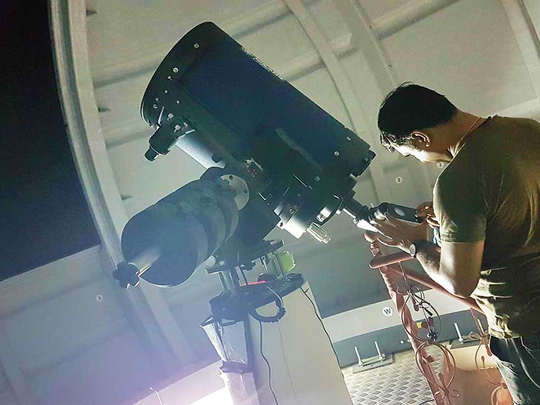
Abu Dhabi: Astronomers at Abu Dhabi’s first space observatory are planning to welcome next week’s partial lunar eclipse which is set to take place on Monday.
The partial lunar eclipse will be visible across the UAE starting from 7.50pm, allowing stargazers the chance to watch the earth’s shadow slowly descend over the moon. The last time a partial lunar eclipse took place was back in 2013.
“This will be a partial lunar eclipse, in simple terms it means that only a part of the moon will be covered by the earth’s shadow as compared to a full lunar eclipse when the earth’s shadow covers the entire moon,” explained Andy Palado, one of the co-founders of Al Sadeem Astronomy.
“This event will have two phases, the first phase is when the earth’s shadow begins to cover the moon and you can see the moon’s brightness starting to dim. The second phase is when the total blackout happens, when the moon’s brightness is completely covered by the earth’s shadow,” he added.
“As a fan of astronomy, it’s is a nice event to witness; it’s a different type of experience, we don’t usually get to see the earth’s shadow, and this celestial event allows us to get a different glimpse of our home planet,” he said.
Palado said that the space observatory — located in Al Wathba area — would be hosting space experts during the event, and would also be carrying out some research.
“We will be taking a lot of footage and images during the partial lunar eclipse, and we will also look at things like the relationship between the weather and the event itself, to see if there is any certain activity that takes place while an eclipse is happening, and to then compare it with the previous partial lunar eclipse that took place to look for any correlations.
“This will be the first time that we get to witness such an event from our space observatory as well, so that makes it very exciting and opens up a lot of good opportunities for us that we did not have before,” he added.
Meteor shower
Palado said that the observatory would also be gearing up to watch a meteor shower happening a few days after the partial lunar eclipse, making it a busy week in space events.
“There is going to be a meteor shower happening on August 12, just a few days after the lunar eclipse, and we are going to be observing and watching this event as well,” he said.
“We are going to start observing the meteor shower from 9pm until the next day. This is one of the biggest meteor showers of the year, and we are expecting up to 100 meteors per hour,” he added.
“During the meteor shower we are going to be counting the total number of meteors, and also looking out for some big fireballs that sometimes occurs with these events as the meteor enters the earth’s atmosphere, so it’s definitely exciting times to be an astronomer,” he said.







